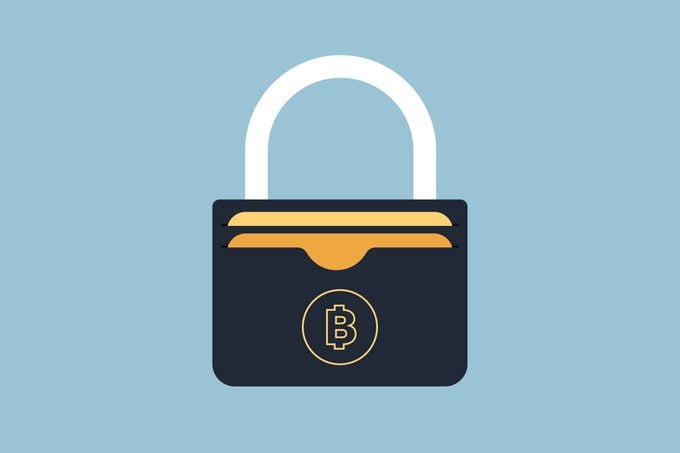6 Common Crypto Scams to Watch Out For
Updated: Feb. 01, 2024

If you trade cryptocurrency (or are thinking about it), you need to know about these common crypto scams
Bitcoin mining scams and other crypto scams are among the newest hustles to hit you in your digital wallet. They’re similar to other online scams, but there’s one major difference: The scammer demands you pay only in cryptocurrency. Why? Crypto exchanges aren’t reversible, and they are typically anonymous. And since the transaction doesn’t go through a bank, there’s no way to flag it as fraud.
Just how common are these types of swindles? In 2021, more than 46,000 people reported losing more than $1 billion to crypto scams, according to the Federal Trade Commission. But there’s good news: “Statistically, crypto scams are becoming less common each year, says Wilson Wei, a cryptocurrency expert and co-founder of CyberConnect. Wei points out that, according to leading blockchain analytics firm Chainalysis, the number of individual transfers to crypto scammers in 2022 is the lowest it’s been in the past four years.
The dip is mainly due to awareness of these scams, so it is important for you to get educated on the forms they take and how to protect yourself. Still testing the waters of crypto trading? Be sure you know what you’re doing—our easy-to-understand explanations of how cryptocurrency works and what bitcoin is will help.
Types of crypto scams
There are two main types of crypto scams. In the first, known as payment scams, the victim thinks they are paying a utility bill, purchasing a product or signing up for a service. In reality, they are just giving the scam artist free crypto.
In the second type of crypto scam, thieves pose as celebrities, cryptocurrency influencers and big shots in the business world—the Federal Trade Commission (FTC) points to more than a few phony Elon Musks. The goal: get unsuspecting people to buy fake cryptocurrency with promises of reaping major investment rewards.
Examples of crypto scams
Blockchain-based fraud takes many forms. While many of these are bitcoin scams, bad actors run cons with all sorts of cryptocurrency, so stay alert. It pays to know what you’re up against, which is why we asked the experts to explain the most common crypto scams.
Investment scams
“Investment scams are most common [among crypto scams] and are surprisingly simple,” says Nick Ranga, senior forex and cryptocurrency analyst at Forex Fraud. You’ll find them all over social media (think spam comments on posts promising a giant chunk of change from crypto investments), dating sites and spam emails. There’s even a form of phone scam in which a fraudster pretends to be an investment manager who can earn you big bucks.
How it works: Scam artists convince victims to invest in cryptocurrency by promising outlandish, guaranteed returns, playing on crypto’s reputation as a volatile asset. After their initial payment, victims see evidence of huge profits, which convinces them to invest even more. If they get cold feet and ask for a withdrawal, the scammers tell them to pay a fee. “The profits are fake, of course, and the victim will never see a penny of them,” says Ranga.
How crypto is involved: According to the FTC, crypto comes into play in a couple of ways: It’s often both the investment and the form of payment.
Pig butchering scams

“Recently, relationship scams have been on the rise,” says John Joy, managing attorney and founder of FTI Law. In a poll by Social Catfish, a company that helps people avoid catfishing, 35% of respondents said their romance scam started on dating apps, and 27% said it started on Facebook. These scams can have serious financial consequences. Of people who responded to the Social Catfish poll, 10% said they’d lost more than $100,000.
It should come as no surprise, then, that there’s a gruesome nickname for this equally grim practice: pig butchering. Often (though not always) linked to romance, this type of scam works by tugging at the heartstrings of its victims.
How it works: In romance scams, fraudsters play with victims’ emotions, hooking them into a one-sided relationship and love bombing them until the victim is in deep. When the scammer has established trust with the victim (the “pig”), they casually mention how much money they are making on a particular trading platform, explains Joy. Sometimes the scammer will even show the victim the evidence of the gains they have had on the platform. Then they invite the victim to join them on the platform.
Once the victim is on the platform, the scam kicks into high gear. The scammer tells them they’ve made a large profit and encourages them to deposit more funds. If the victim wants to withdraw the funds, the scammer often asks that they pay transaction fees. Not only do victims lose their investments, but they lose money on the transaction fee too. “It is a devastating cycle, as victims often pay more and more to the scammers as they cling to the hope that they can recoup their investment,” says Joy.
How crypto is involved: Unlike traditional romance scams, the goal here is for the fraudster to earn crypto. And remember, it’s not always about romance. Pig butchering can involve a fabricated romantic relationship, but there are other ways for scammers to play up emotions. Consider the case of a California man who, in 2021, lost $1 million to a pig-butchering crypto scam run by someone posing as an old colleague.
Impersonation scams
When it comes to crypto scams, you may be most likely to encounter investment scams. But Ranga says impersonation scams are also very common.
How it works: Scammers contact victims, pretending to be from the bank or a government organization, like the IRS or FBI. They may pretend to be from a well-known company (think Amazon or Microsoft), create phony ads for fake companies that say they’re entering the crypto space or post fake job listings.
The request differs based on the variety of the scam: A phony IRS agent, for instance, might convince victims that their money is at risk of fraud or a criminal investigation. And a fake job offer might require you to pay a fee first.
How crypto is involved: No matter the type of impersonation scam, the goal is for the victim to send the scammer crypto. Impersonating an IRS agent, FBI agent or Amazon representative, a scammer might tell the victim the only way to protect their funds is by investing the money in cryptocurrency. Of course, that money goes straight into the scam artist’s pocket.
A fake business may issue a coin or token, but instead of providing people with a smart investment, they steal money from anyone who buys them. And a fake job may request that would-be employees deposit a chunk of change—in crypto, naturally—in order to qualify for the position.
Rug-pull scams
One of the newer classes of crypto scams, rug-pull schemes have touched everything from NFTs to other Web3 projects. The term is a nod to the phrase “pull the rug from under,” and that’s exactly what scammers do to unsuspecting investors.
How it works: Rug-pull scams involve trading on the name of well-known, reputable brands. Using a trendy franchise name, a new crypto trader promotes a new project and gains the trust of investors, then suddenly stops trading and keeps all the money.
“Late last year, there was a new crypto website, SquidGame.cash, for a trending cryptocurrency, supposedly connected to the hit show Squid Game,” says crypto expert and Modulus CEO Richard Gardner. The token had a meteoric rise but turned out to be a scam.
How crypto is involved: Cryptocurrency is involved from start to finish. Scammers create a crypto project, victims invest with hopes of hitting it big and the scammers reap rewards in the form of cryptocurrency.
Utility scams

Though it’s a common bitcoin scam, this type of fraud may involve other cryptocurrencies as well. It takes advantage of people who desperately need utilities, such as electricity during a heat wave.
How it works: The scammer will contact the victim, often with a text, claiming to be a representative from a utility company. They say a bill is due, and to prevent the company from shutting off service—whether that’s water, electricity, cable or something else—the victim must pay. The urgency of the situation can cloud the victim’s judgment, leading to them paying the scammer.
How crypto is involved: Scammers tell their victims to pay in order to keep the service running, but they won’t accept just any form of payment. They want cryptocurrency. But as the FTC points out, utility companies won’t text about a potential service shut-off. What’s more, they won’t ever demand payment via crypto, gift cards or wire transfers—those requests are sure signs of a scam.
Phishing scams
Scammers love phishing emails for a reason: They work. This type of social engineering attack uses phony emails and texts (called smishing) to gather information from unsuspecting victims. Often these messages link to malicious websites or apps, which install viruses, give hackers access to a device and steal personal information.
How it works: Scammers can mimic applications and sites that crypto traders usually use. The trick is getting people to click on them. They do this by sending an email or text, pretending to be a familiar cryptocurrency company. The message will include a link to what looks like a typical app or site—but it’s a fake. By clicking the link, you give scammers access to your digital wallet and the opportunity to drain your crypto accounts.
How crypto is involved: Unlike similar schemes (you’ll often come across Apple phishing emails, for instance), this type of phishing scam is all about the blockchain, which means it’ll come from a company associated with cryptocurrency.
Red flags for spotting a crypto scam

All of that sounds pretty scary, but here’s the good news: Crypto scams are pretty easy to spot if you know what to look for. Here are some ways to identify a scammer.
A typo-riddled white paper
As with other types of fraud, including Google Voice scams and Geek Squad scams, poor spelling and grammar are a major tip-off.
“The first thing any crypto investor should do when considering a new coin is to read the white paper and do their due diligence,” says Gardner. “In the case of the Squid Game scam, and most scams, it is very easy to tell that the white paper was not prepared by professionals. The coin claimed to be a partnership by Netflix and Disney, and yet the white paper was riddled with typos. That’s just not something a legitimate company, or crypto, would do.”
Crypto-only transactions
The FTC states that one of the most obvious signs of a crypto scam is a transaction that can only be performed with crypto. If a company or service takes only crypto, move on.
Crypto invitations
“Anyone asking you to invest in a cryptocurrency platform is a red flag,” says Joy. “If you are getting involved in crypto investing, it should be something initiated by yourself.”
Guaranteed returns
Nothing is guaranteed. If someone is telling you that a crypto opportunity has a guaranteed return, run. “A good rule of thumb is, if it seems too good to be true, it is,” says Wei.
Requests for personal information
Remember, no reputable company will ask you for your crypto wallet key.
How to protect your digital wallet

Use these steps to keep your digital wallet safe from crypto scams:
- Never share your crypto key.
- Disconnect your wallet from sites after interactions so there isn’t additional access to it.
- Don’t click links. Go directly to the site or app. These tips will help you decide if a site is fake.
- Stop and research before investing in crypto opportunities. “Ideally, ask an investment advisor or wealth manager who you can meet in person about the best way to invest,” says Joy.
- Make sure you use strong passwords for all your accounts, and set up two-factor authentication for extra security.
If you get scammed, be sure to contact your local authorities and file a report with the FTC. Just know that, because crypto transactions usually aren’t reversible, you may not get your money back. Though it’s no guarantee, the FTC suggests contacting the company you used to send cryptocurrency to the scammers, relaying that it was a fraudulent transaction and asking if they can reverse it.
Get Reader’s Digest’s Read Up newsletter for more tech tips, humor, cleaning, travel and fun facts all week long.
Sources:
- Wilson Wei, crypto expert and co-founder of CyberConnect
- Nick Ranga, senior forex and cryptocurrency analyst at Forex Fraud
- John Joy, managing attorney and founder of FTI Law
- Richard Gardner, crypto expert and CEO of Modulus
- Chainalysis: “Mid-Year Crypto Crime Update: Illicit Activity Falls with Rest of Market, with Some Notable Exceptions”
- Federal Trade Commission: “Reports Show Scammers Cashing In on Crypto Craze”
- Federal Trade Commission: “What to Know About Cryptocurrency and Scams”
- Social Catfish: “State of Internet Scams 2022”
- Forbes: “How One Man Lost $1 Million to a Crypto ‘Super Scam’ Called Pig Butchering”



